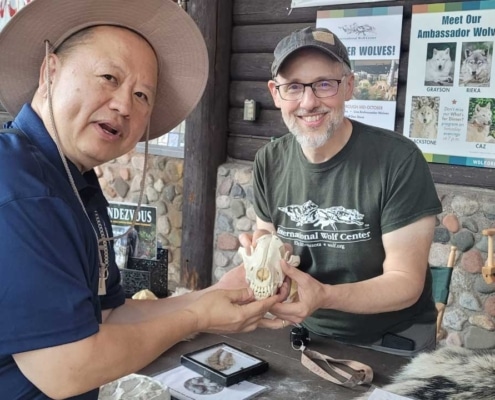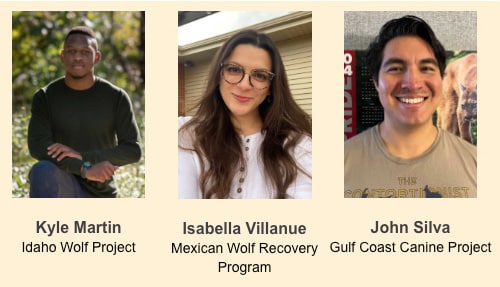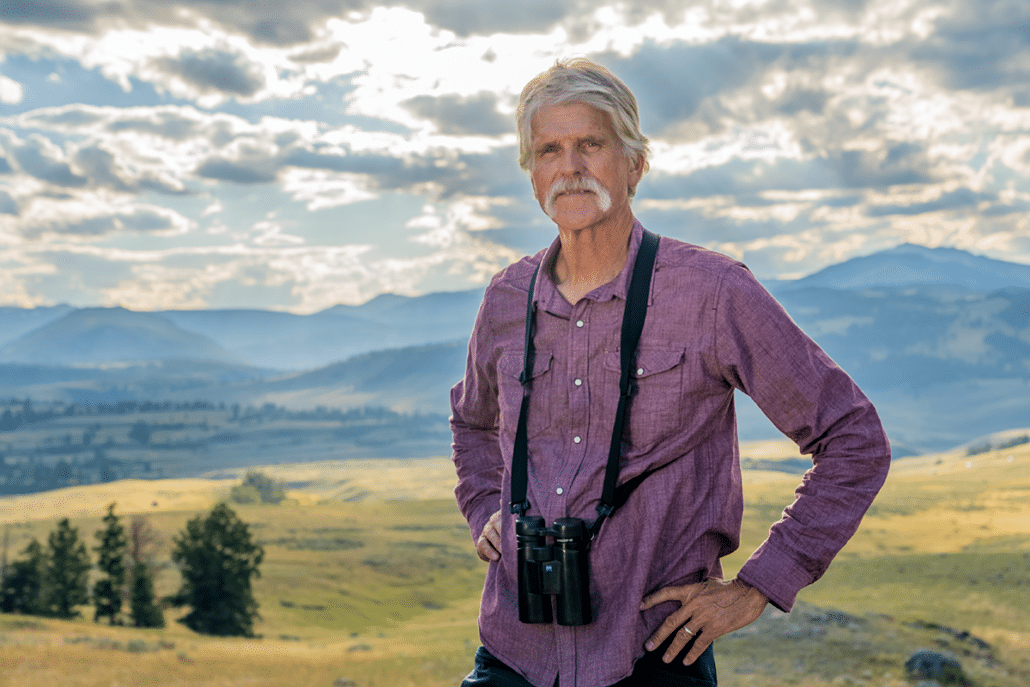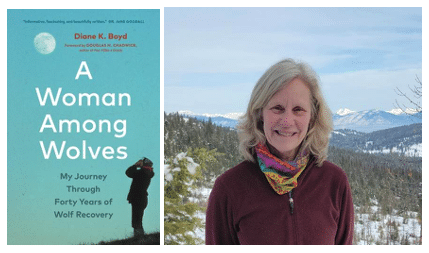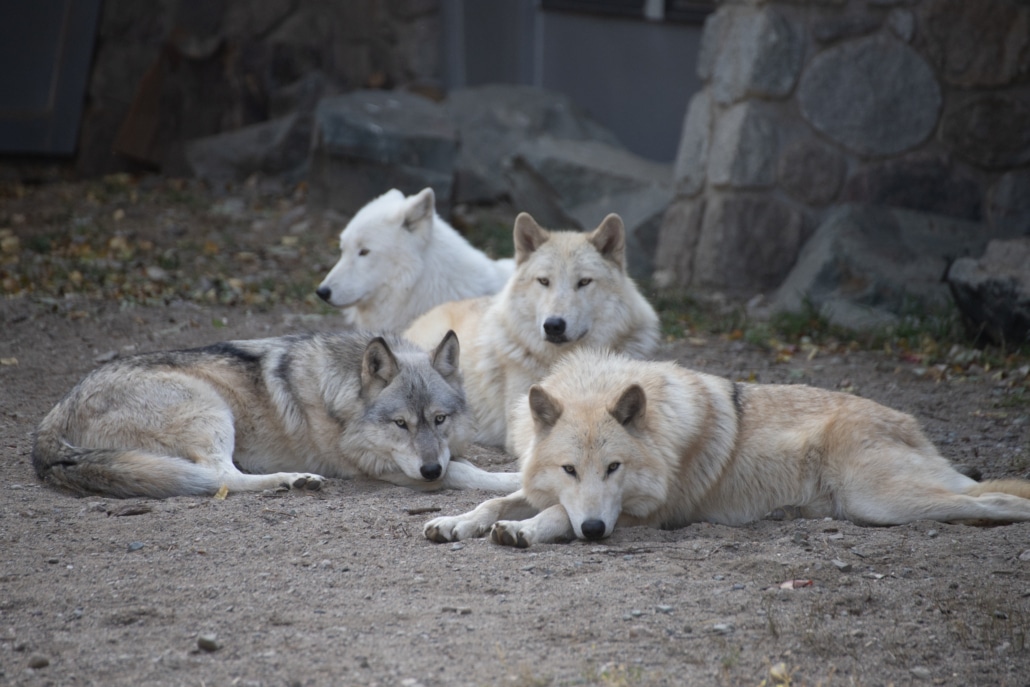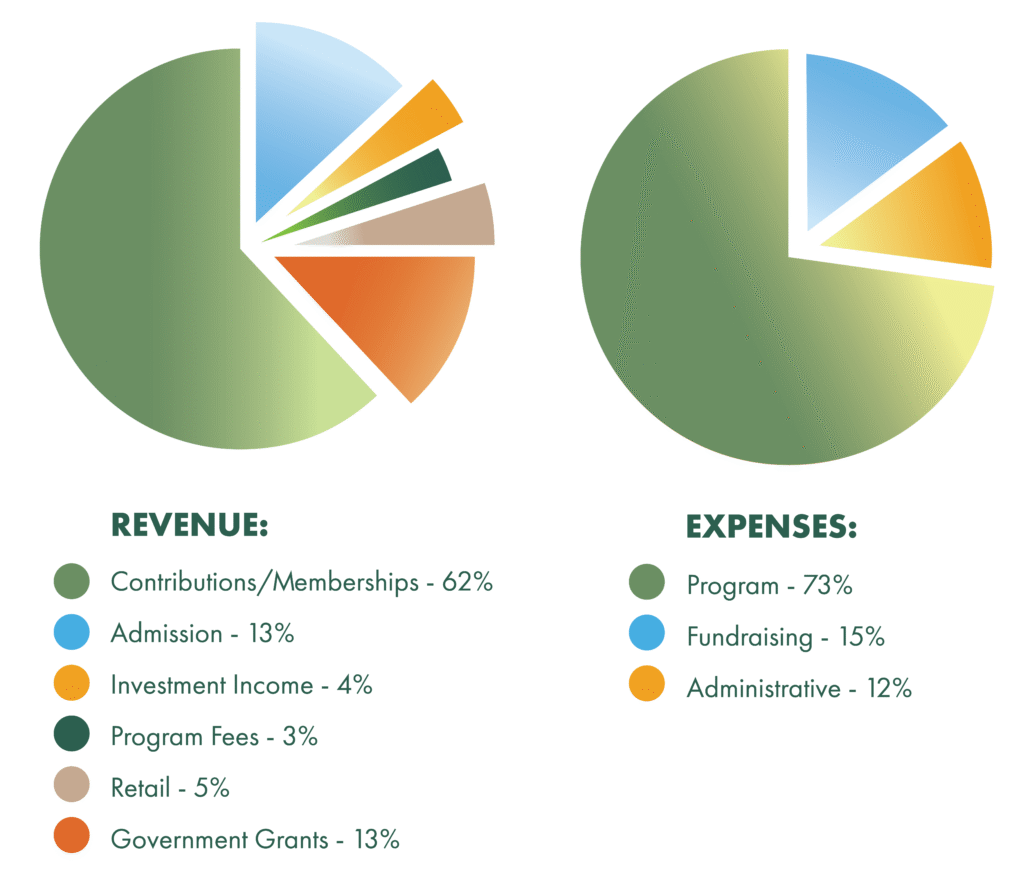From Our Leadership
Executive Director’s Letter
2024 was a time of farewells for the International Wolf Center. Most notably, we said goodbye to our long-time wolf curator, Lori Schmidt, who retired after three decades of service. We also lost Axel, a popular ambassador wolf and key pack member. While these losses were difficult, we are so fortunate to have a strong Wolf Care team in place that Lori helped to build, led by curator Giselle Narvaez Rivera, and we are confident in the future of our Wolf Care program.
Our summer issue of International Wolf magazine said farewell to International Wolf Center founder Dr. L. David Mech’s Superior National Forest Wolf-Deer Study. While this nearly six-decade-long study has completed its work, wolf monitoring and research in Northern Minnesota continue, and we continue sharing this important work with our community. In June, the International Wolf Center had the opportunity to launch a special exhibit in partnership with the Voyageurs Wolf Project titled “Starvation, Adaptation and Survival,” which has now been seen by tens of thousands of visitors.
A very happy farewell in 2024 was saying goodbye to our failing Visitor Center roof. The construction in the fall was a bit disruptive for both human and canine residents (except for Blackstone, who seemed fascinated by the process), but we were so pleased to be able to retire the “drip buckets” we had stashed around the Center. We are sure our guests are happy they are gone!
So, as we say farewell to 2024, we do so with a sense of gratitude for everything we’ve accomplished (see below for some more highlights!) and in anticipation of what’s to come. Our pack is strong and growing every day…and we are so grateful to have you out there supporting our mission of wolf education.
Education
Dr. L. David Mech Fellowships
The Dr. L. David Mech Fellowship annually awards undergraduate students a $10,000 fellowship. The Fellowship aims to reduce barriers for students from diverse backgrounds by providing the bridge support necessary to explore careers in natural sciences or wildlife biology. Recipients receive a $6,000 stipend and are reimbursed up to $4,000 for research-related expenses such as gear and travel.
In 2024, Isabella Villanueva, Kyle Martin and John Silva were awarded the Fellowship. Isabella participated in field work through radio telemetry, tracking surveys of scat and tracks, den site observations as well as data analysis with the Mexican Wolf Recovery Program in New Mexico. Kyle completed intensive field work surveys with the Idaho Wolf Project through camera and song meter wildlife recorders, as well as conducting howling surveys. John’s fieldwork took place throughout the coastal areas of Texas and Louisiana to identify and collect scat samples before conducting DNA extractions from the samples for genetic work on red wolves at a lab in Michigan. Isabella, Kyle and John each have long-term goals of continuing their education to pursue careers in wildlife conservation or research.
National Geographic Live: Wild Wolves of Yellowstone
In October 2024, the International Wolf Center partnered with National Geographic Live to present Wild Wolves of Yellowstone at the Ordway Concert Hall in Saint Paul. The event featured renowned wildlife biologist Doug Smith, who led the Yellowstone Wolf Project and played a pivotal role in the reintroduction of gray wolves to Yellowstone National Park. Doug shared never-before-seen photos and videos documenting the ecological transformation sparked by the wolves’ return. His insights offered a powerful example of the role wolves play in healthy ecosystems—and the importance of long-term conservation work. As a special benefit, International Wolf Center supporters were invited to a private reception with Doug prior to the event, creating an exclusive opportunity for deeper engagement and learning. The event strengthened the Center’s visibility, celebrated a landmark conservation success, and brought the story of wolves to a wide and enthusiastic audience.
Happy Hour Howl with Diane Boyd
Also in October, the International Wolf Center was honored to host renowned wildlife biologist Diane Boyd as part of our Happy Hour Howl series at St. Paul’s Summit Brewery. A trailblazer in wolf conservation, Diane was among the first women in the U.S. to study wild wolves in their natural habitat. She joined us to share stories from her debut memoir, A Woman Among Wolves – My Journey Through 40 Years of Wolf Recovery. With humor, heart, and deep expertise, Diane recounted adventures from the field—crossing icy rivers, flying in bush planes, and observing wolf packs up close. The event gave members and guests a rare opportunity to hear the personal side of wolf recovery history and connect more deeply with the mission of the Center.
Wolf Care
Wolf Care Annual Summary
In 2024, the Wolf Care Department went through some significant changes. Lori Schmidt, the lead of the wolf care team for more than 30 years, retired in April. Lori is the reason for such a strong ambassador wolf program and the beautiful and practical design of the ambassador habitat. Her work was foundational in the management of wolf packs under human care. Lori’s retirement was a multi-year-long process that helped ensure a smooth transition to Giselle Narváez Rivera as the wolf curator, Abby Keller as the assistant wolf curator, and Lexi Ham as the wolf care specialist. The Wolf Care and Science Department needs at least three full-time staff members to maintain the high-quality care that the wolf ambassadors deserve.
April was a hard month for us, humans and wolf ambassadors. Not only did we experience Lori’s retirement, but we also said goodbye to our beloved ambassador Axel. The care team had observed the beginning of some physical and behavioral changes in Axel in 2022. In May of 2023, we conducted a medical exam and learned that he had a rare condition known as sebaceous adenitis (SA). We initiated treatment immediately, and he responded well, but these were also strong medications. Early in 2024, he was acting more subdued and having gastrointestinal issues. We stopped treatment for SA early and expected improvements. However, he was retired in April, and blood work revealed he had severe anemia and was in advanced kidney failure. He was humanely euthanized on a warm Sunday afternoon on April 21, 2024. He went peacefully and was surrounded by many of his most trusted care team members.
Shortly after Axel passed away, the social dynamics of the pack changed significantly. We witnessed Grayson’s confidence grow strong and develop into a well-respected leader. While in the previous winter we saw Rieka consistently grab-bite Grayson’s rear, he started facing her off and chasing her away. This one change in behavior shifted the way that Rieka and Grayson interacted. They started engaging in many social sequences, including play bows, invite chases, and jaw sparring. The males remained respectful and submissive to Grayson, which helped solidify his leadership role as the dominant male in the pack. Rieka’s confidence also strengthened as the dominant female, and her relationships with the males evolved. With some help from Caz, she played a significant role in maintaining Blackstone’s lower ranking status in the pack.
Finally, 2024 was also one of many challenges when it came to facilities maintenance and repairs. We conducted major repairs on our pond system and our carcass freezer. We finalized our heated and insulated garage. All our buildings were stained, and the roof of the main building was replaced. A significant amount of staff and volunteer hours were needed to ensure the wolves were safe and not undergoing increased stress. This also required significant funding. We are so deeply thankful for all the support we received from our members. It is thanks to you all that we can continue providing our wolf ambassadors with the high-quality care they deserve and support our mission.
Financial information
Annual Expenses and Revenue
2024 was a strong year financially for the International Wolf Center, thanks to incredibly generous support from our members. With income of $3,362,235 and expenses of $2,381,415, we ended the year with net ordinary income of $908,820. The International Wolf Center was pleased to once again receive a four-star rating from Charity Navigator in 2024, as an indicator of our organization’s effective use of donor resources to accomplish our wolf education mission.
Thank you!
Financial Statements
For older financial statements, please email info@wolf.org.
Annual Reports (pdf)
Financial Audits (pdf)
2024 Audited Financial Statement
2023 Audited Financial Statement
2022 Audited Financial Statement
Federal 990’s (pdf)

The International Wolf Center is a 501(c)(3) organization.

